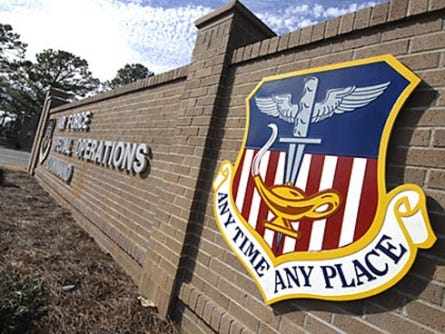
HURLBURT FIELD — Over the past year, the base has upped its sexual assault response training.
The number of trained sexual assault victim advocates has doubled, and this past month Hurlburt Field expanded the training to instructors at its airman leadership school.
The training program is designed to grow the support system for victims and encourage them to come forward to talk about assaults.
It is also part of a larger mission to try to eliminate a culture in the military that may allow sexual assaults to occur and discourage victims from reporting them.
Janet Morrison, the sexual assault response coordinator at Hurlburt, was excited to teach the advocate course to five instructors at the Vincent Airman Leadership School, which trains all airmen being promoted to management as staff sergeants.
The instructors will use what they learned to supplement the lessons they already teach on sexual assault.
“This will help the instructors better explain the consequences and the issues surrounding sexual assault in the military and pass on that information to our future leaders,” Morrison said. “We may be able to change the culture of the military by starting with these leaders.”
Four other airmen attended the 40-hour, weeklong course that wrapped up Feb. 22. That brought the total number of trained victim advocates at Hurlburt to 38.
That’s up from 19 in 2011, when Morrison took over the program. A similar program at Eglin has about 60 victim advocates.
They are all volunteers, and Morrison said interest is growing.
The Air Force has put greater emphasis on stopping sexual assaults in recent months. Last year, a sex abuse scandal came to light at Lackland Air Force Base in San Antonio, Texas, where every recruit attends basic training.
More than 30 instructors are being investigated in connection with more than 60 victims who have alleged some type of sexual misconduct there.
In November, Secretary of the Air Force Michael Donley sent a letter to airmen stating that sexual assaults will not be tolerated and that every airman must combat the problem. Although final numbers have not been released, the Air Force expects more than 700 airmen to have reported sexual assaults in 2012. However, the actual number likely is much higher because many victims do not report them.
Donley called on airmen to intervene when they see potential for harm, discourage sexist behavior and attitudes, and provide victim care.
While all airmen receive some sexual assault training, the victim advocate course goes into more depth about the problem, what types of responses the victim might have and what resources are available to help.
If a victim comes forward and chooses, Morrison can call on an advocate in the age range, sex and line of duty that they request.
“The advocates can follow them throughout the whole process and be on call 24/7 for that person and whatever they might need,” Morrison said.
Their duties can run the gamut — from taking victims to the hospital to offering them support in interviews with law enforcement and helping them through the court process.
In accordance with a law passed last year, discussions between an advocate and victim are confidential; law enforcement cannot compel their disclosure, Morrison said.
The training course also teaches about the type of culture that can make perpetrators feel they can get away with sexual assault, which includes sexist or racist attitudes or behavior, Morrison said. Advocates can take that knowledge back to their units.
“Having that awareness, now when they see something that they previously might have thought harmless, they can set the standard by saying we don’t tolerate this,” she said.
Master Sgt. Paola West, head of the Airman Leadership School at Hurlburt, said her instructors requested the additional training to use during the 45-minute sexual assault segment they teach as part of the five-week leadership course.
About 420 airmen go through the course each year.
The training helps West’s instructors answer questions the students may have about sexual assault.
She said it’s important for new airmen moving into front-line supervisory positions to have learned about sexual assault response and prevention.
“The more we talk about it, the more we can assure that it’s minimized,” she said. “The biggest thing we emphasize is if you see something, say something.”
That thing could be as simple as a joke, she said.
“We want to hold our airmen accountable to be professional airmen,” she said.
Contact Daily News Staff Writer Lauren Sage Reinlie at 850-315-4443 or lreinlie@nwfdailynews.com. Follow her on Twitter @LaurenRnwfdn.
This article originally appeared on Crestview News Bulletin: Local bases step up war against sexual assault
